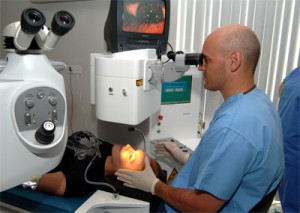Professor Johnny Moore examines a patient in his Belfast facility
A teaching initiative by a University of Ulster duo is setting new training standards in refractive surgery – more commonly known as laser eye treatment.
Eye specialists and others involved in refractive surgery in several countries are nearing completion of a novel e-learning course, which promotes much-needed expertise in treatments that are currently unregulated internationally.
Dr Tara Moore, a Lecturer in the School of Biomedical Science in Coleraine, has used part of a £50,000 National Teaching Fellowship from the Higher Education Academy to develop this online programme. The fellowship recognises and supports inspiring innovative university teaching.
Consultant Ophthalmologist Johnny Moore, along with colleague Mr Sunil Shah, one of Britain’s leading refractive surgeons and past president of British Society for Refractive Surgery, spotted the need for internationally recognised standards and structured teaching in refractive surgery. Johnny is a Visiting Professor at the University of Ulster and treasurer of the British Society for Refractive Surgery.
Refractive surgery has become common in recent years with approximately 100,000 procedures performed per year in UK. Many practitioners are self-taught and training is often ad hoc. Experts say high-profile instances of poor treatment have underlined the need for a regulated approach to ensure best practice. A government select committee is currently in dialogue with the Royal College of Ophthalmologists discussing initiatives for the assurance of appropriate training and standards of care within refractive surgical practice.
Professor Moore said: “The rapidly increasing popularity of laser eye treatment is highlighting a vital need for structured tuition and internationally agreed standards. In Britain no formal training refractive surgical training exists at present. Most people who undertake it teach themselves, with some help from short introductory courses available from organisations in different countries and specific instrumentation courses organised by manufacturers.”
“ E-learning is particularly useful for busy clinicians who find it difficult taking time out of their schedules to attend courses. This refractive surgery programme offers students a comprehensive grounding in refractive surgical management, which can subsequently be added to by ‘hands on’ surgical experience. Participants swap information, learn by case studies and get the benefit of the lectures by world authorities on refractive surgery.”
Ophthalmic surgeons, nurse practitioners and refractive technicians from Ireland, United Kingdom, New Zealand and Italy have signed up for the e-learning programme, delivered through the Continual Professional Development Unit and Campus One, the university’s award winning online campus.This inaugural class receives the university’s Certificate in Refractive Surgery this month (June 2006).
Tara Moore said: “Through Campus One we are able to provide a comprehensive distance learning programme designed to improve the knowledge and understanding of refractive surgery for this multidisciplinary team. The programme is spread over two modules, each consisting of 12 weeks of flexible study. It is a complete introduction to the how, what and when of refractive surgery. An impressive collection of internationally recognised experts has provided a series of lectures, live surgical videos, pod casts and assessments. E- tutor and student led discussion of specific case scenarios allows for an enriched student learning experience with numerous opportunities for peer learning which has turned out to be one of the highlights of this current programme.”
Dr Moore hopes the e-learning programme will receive recognition from the Royal College of Ophthalmologists and the government as a suitable qualification for individuals involved in refractive practice locally, nationally and internationally.
Further information contact: Dr Tara Moore t.moore@ulster.ac.uk or tel +44(0) 28 7032 4577
